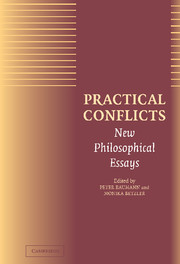Book contents
- Frontmatter
- Contents
- Foreword
- 1 Introduction: Varieties of Practical Conflict and the Scope of Practical Reason
- 2 Willing the Law
- 3 The Myth of Egoism
- 4 Thinking about Conflicts of Desire
- 5 Putting Together Morality and Well-Being
- 6 The Second Worst in Practical Conflict
- 7 Personal Practical Conflicts
- 8 Sources of Practical Conflicts and Reasons for Regret
- 9 Conflicting Values and Conflicting Virtues
- 10 Involvement and Detachment: A Paradox of Practical Reason
- 11 Outcomes of Internal Conflicts in the Sphere of Akrasia and Self-Control
- 12 Are There Insolvable Moral Conflicts?
- 13 Moral Dilemmas of Transitional Justice
- 14 Do Conflicts Make Us Free?
- List of Contributors
- Name Index
- Subject Index
- References
14 - Do Conflicts Make Us Free?
Published online by Cambridge University Press: 02 December 2009
- Frontmatter
- Contents
- Foreword
- 1 Introduction: Varieties of Practical Conflict and the Scope of Practical Reason
- 2 Willing the Law
- 3 The Myth of Egoism
- 4 Thinking about Conflicts of Desire
- 5 Putting Together Morality and Well-Being
- 6 The Second Worst in Practical Conflict
- 7 Personal Practical Conflicts
- 8 Sources of Practical Conflicts and Reasons for Regret
- 9 Conflicting Values and Conflicting Virtues
- 10 Involvement and Detachment: A Paradox of Practical Reason
- 11 Outcomes of Internal Conflicts in the Sphere of Akrasia and Self-Control
- 12 Are There Insolvable Moral Conflicts?
- 13 Moral Dilemmas of Transitional Justice
- 14 Do Conflicts Make Us Free?
- List of Contributors
- Name Index
- Subject Index
- References
Summary
Sometimes we wonder whether we should act in one way or another; we are unsure whether we should do A or B. In situations such as these, different reasons count in favor of different actions, and in our view the different reasons are so strong that we do not quite know which of these reasons should guide our actions. If this is the case, we are in a practical conflict.
Being in a situation of this type seems to be an exception, and yet, in my view, it is situations such as this that nourish our hope that we can act freely. This is so because in general we believe that in order to be free in the way relevant to responsibility, the agent has to be able to do A or the alternative B in a controlled manner. And since we can act in a controlled manner only if we act in accordance with reasons, this implies that we can act freely only if we can act in one way or another in accordance with reasons. We see below that we cannot perform alternative controlled actions unless we are in a conflict situation. Therefore it would appear that we can act freely only in conflict situations. In the following sections I shall begin by arguing that we cannot be free unless we are in a situation of conflict. I will then discuss whether conflicts really are the pockets of freedom we seek.
- Type
- Chapter
- Information
- Practical ConflictsNew Philosophical Essays, pp. 316 - 333Publisher: Cambridge University PressPrint publication year: 2004
References
- 2
- Cited by

